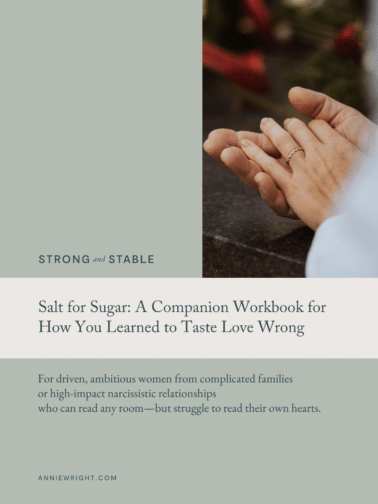TL;DR –The inability to visualize a future—let alone a positive one—is a hallmark trauma symptom that leaves survivors unable to imagine themselves at 80, make New Year's resolutions, or work backward from long-term goals that others take for granted. Trauma disrupts this capacity through three mechanisms: altering memory and autobiographical recall needed for "mental time travel," impairing executive functioning required for planning and organizing future actions, and creating negative self-concepts that make positive futures seem impossible for someone "broken" or "unworthy." These neurological adaptations that once protected you now prevent essential life planning—education, career development, financial security, healthy relationships, medical care—leaving you unable to take actions that would support your future self.
Recovery involves rewiring these neural pathways through trauma-informed therapy, particularly brain-based approaches like EMDR, combined with practical exercises that make the abstract future feel real. Using aging apps to visualize your elderly face, practicing guided visualizations of yourself at 80 in two scenarios (with and without planning), and "acting as if" you're someone who cares about their future can help bridge the gap between trauma's presentism and future orientation. The brain's plasticity means this skill can be developed at any age—just because you can't imagine growing old now doesn't mean this capacity is forever lost.
2022 – the new year – is nearly upon us.
It’s genuinely hard to believe it.
In so many ways, 2021 flew by for me.
And now, as I sit writing you this essay in the last week of the year, I’m aware that, as usual in a few days time, many folks – myself included – will be making resolutions, plans and intentions for the new year, laying the groundwork for what they hope will be a good, fruitful year and future for themselves.
But for so many of my readers who come from relational trauma backgrounds, this – making resolutions, intentions and plans for the new year and for their future – may not be something they feel drawn to do or even capable of doing. Because an inability to visualize a future for oneself (let alone a positive future) is a hallmark trauma symptom.
If you relate to this – if you struggle to envision a future or older/elder version of yourself – and if you’d like to know more about why this might be and, more importantly, how we can help you overcome this, please join me on the blog today to keep reading.
Why do I struggle to visualize a future for myself?
“Why do I struggle to visualize a future for myself, let alone a positive one?”
I’ve been practicing as a clinical psychotherapist for ten years. And I can’t tell you how many times I’ve heard some iteration of this question.
And the question is always almost paired with some degree of incredulity. That there are people out there who can really, truly do this. Think forward decades into the future and visualize a positive, happy outcome for themselves. And then work backward, taking steps that secure that future.
It sounds as unbelievable to someone with a trauma history that this is possible. As much as it sounds impossible for someone with a normative psychological background to believe that others can’t imagine a future version of themselves.
This may seem incredible to some. But the inability to visualize a future – let alone a positive future – is indeed a hallmark of coming from a trauma background.
Why is this?
Terrific research has been done and continues to be done on why, exactly, trauma impacts one’s ability to visualize a (positive) future for oneself. Detailing the full breadth of that research is beyond the scope of this essay. But I’ll share the three primary ways I’ve personally and professionally come to understand how and why trauma alters the brain’s ability to imagine a future for oneself:
Trauma alters memory.
With trauma survivors, access to autobiographical data points and past memories may be greatly impaired as a result of the brain’s adaptations to the trauma they lived through. And when this ability to reach back into the past and construct a sound, cohesive narrative is impaired, it may make it difficult if not impossible to “mentally time travel” into the future and achieve the mental flexibility required to visualize a future – let alone a positive future.
Curious if you come from a relational trauma background?
Take this 5-minute, 25-question quiz to find out — and learn what to do next if you do.
START THE QUIZTrauma can impair executive functioning.
Executive functions – housed in the frontal lobes of the brain – are the set of skills that allow us to, broadly speaking, plan and monitor our actions. For example: organizing, planning, and prioritizing complex tasks; starting actions and projects and staying focused on them to completion; regulating emotions and practicing self-control; practicing good time management, etc. When these critical skills are impaired, it can make it more difficult (if not impossible) to plan and take action towards a (positive) future for oneself.
Trauma can alter one’s self-perception fundamentally.
Per extensive research (not to mention this being a core diagnostic criterion of PTSD in the DSM-5), we know that trauma survivors are often left with negatively altered cognitions about themselves, others, and the world in the wake of trauma. Plainly put, negatively altered self cognitions can often leave trauma survivors with a core belief that they are “broken, dysfunctional, and/or unworthy of being treated well” (by themselves and others). With such a negatively altered self-concept, the ability and motivation to plan for a (positive) future is greatly hindered.
What are the costs and consequences of not being able to visualize a future for myself?
Whether you struggle to visualize a positive future for yourself because of any one of the above reasons (or all of them together), the inability to visualize a positive future for yourself can have deleterious, multitudinous impacts on the developmental stages of a human life cycle including but not limited to:
- Failure to plan for a sound education;
- Failure to plan for a sound career;
- Failure to plan for a sound, rooted-in-reality financial future;
- Failure to cultivate and sustain healthy, functional, rooted-in-reality relationships;
- Failure to protect and nurture your physical safety;
- Failure to protect and nurture your medical health;
- Failure to protect and nurture your mental health;
- Failure to plan for and protect your reproductive health;
- And so much more.
Each and all of these aforementioned tasks, when properly considered and planned for, are, arguably, essential in supporting someone to lead a functional, healthy early, mid-and late-adulthood.
Obviously, then, the ability to visualize and plan and work for a positive future for oneself is critically important.
So what can be done to help someone who struggles with this to better visualize a positive future?
How can I begin to visualize a future for myself?
If you come from a trauma background – particularly a relational trauma background where the trauma you sustained took place over a longer period of time – trauma recovery work will be essential in helping you begin to better visualize a positive future for yourself.
I’m a particular proponent of brain-based trauma recovery therapies – especially EMDR – to support trauma recovery.
But trauma-informed talk psychotherapy can be extremely effective, too.
In addition to brain-based and/or trauma-informed talk psychotherapy, when working with my clients and online course students, I assign additional psychotherapeutic exercises to help them personalize and better realize their futures. Here are just a few of them:
“Age” a photo of you to get more in touch with your older self.
FaceApp is one such app that does this, AgingBooth is another, Oldify, or simply Google “age your face app” and you’ll come across other resources. By aging our faces, we start to make something that feels abstract and surreal (old age, the fact that we may someday be 80) feel more real and thus more important to consider and plan for and act in service of. It’s hard to imagine that at age 25, 30, 35, or even 40 that we’ll be frail and elderly when we’re in the prime of our lives. By aging a photo you can connect more viscerally to your future self and in connecting that way, you may not only personalize your future but you may also feel more motivation to take action to support your future.
Practice this visualization to see yourself as an old person in two future scenarios:
Scenario One:
Close your eyes, settle your body, breathe deeply. Now bring to mind your future self at age 80 if you haven’t changed your habits and actions. If you haven’t planned well for your future. See what kind of environment/home you might be in. See what’s in your fridge. Imagine what’s on your calendar in terms of work versus unstructured time. Or imagine having medical bills and what your ability to pay them might be.
Imagine wanting to be able to fly across the country to visit your grandchildren. (if you choose to have children) Will you be able to do so whenever you want? How will your children – if you have any – be obligated or unobligated to support you financially, logistically, psychologically? How do you imagine you’ll feel about money and your aging body and mind? Will you feel relaxed? At ease? Or worried? Will you have healthy, connected relationships around you or will you be alone?
Really lean into this vision. And, when you’re ready, come out of it. Feel free to jot down any notes that stood out to you about what your future self may have to endure if you DON’T change your habits and actions and if you don’t start visualizing a future for yourself.
Scenario Two:
I want you to again imagine that you’re 80. But in this scenario, you HAVE changed your habits, actions, and your willingness and desire to plan for your old age. You’ve implemented the action steps you need to care for your future self. Financially, logistically, mentally, physically, socially, and emotionally.
Now, envision the environment you’ll be in if you transform these habits and behaviors and your ability to work towards a future. Think about the freedoms you’ll have to work or not work, to travel to see your grandkids (if you choose to have children), or travel to destinations you always wanted to see. Imagine what kind of health you will have, what kind of pride you will have about your life, and how you’ll be able to take care of yourself and your loved ones with the assets and actions you’ve long ago put in place.
Really lean into this vision. And when you’re done, come back to the room and jot down any notes you want.
Act as if.
I’m a big believer in faking it until you make it. And so if connecting to a vision of your future self feels challenging and the above exercises yield no motivation for you, try this next exercise and begin acting as if you were an esteemed, self-loving person who cared deeply about their own future. Pick someone you admire. Michelle Obama. Jacinda Ardern. Robin Arzón. What would they do to plan for their future? How would they act if they knew they would live until 80 and wanted to give themselves a great life at that point? How would they approach that situation or choice you’re facing in the present?
Rewiring Future Orientation Through Trauma-Informed Planning Therapy
When you sit with your therapist unable to explain why everyone else makes five-year plans while you can’t imagine next month, let alone being 80, you’re describing a profound neurological impact of trauma—but therapy can help you understand that creating a beautiful adulthood for yourself begins with rebuilding your brain’s capacity to imagine futures worth living.
Your trauma-informed therapist recognizes that your inability to visualize aging isn’t laziness or pessimism but evidence of a nervous system that learned the future was too dangerous to contemplate. When survival required all your resources for the present moment, your brain sacrificed tomorrow for today.
The therapeutic work involves both understanding and practice. Your therapist might have you use aging apps to see your 80-year-old face, making the abstract concrete. Together, you’ll practice guided visualizations comparing two futures: one where you continue without planning, another where you take protective actions now.
Through exercises like “acting as if”—choosing someone you admire and mimicking their planning behaviors—you begin building neural pathways for future orientation even before internal motivation arrives. Your therapist helps you start small: planning next week before next year, imagining 40 before 80.
Most powerfully, future-oriented therapy teaches that your brain’s plasticity means this isn’t permanent. Every time you successfully imagine and plan for tomorrow, you’re literally rewiring trauma’s presentism, proving that futures—even positive ones—are possible for someone who once couldn’t imagine surviving childhood.
Wrapping this up…
As we conclude today’s essay and as we conclude 2021, I want to remind you that if you struggle to visualize a future for yourself (let alone a positive future!) for this coming new year or for any point moving forward, this makes perfect sense if you come from a trauma background.
And I’ll also remind you: the brain is plastic. We can rewire and alter our neural pathways (and thus our cognitions and behaviors) up until the day we die.
Just because you can’t visualize a future for yourself now, doesn’t mean that this skill isn’t possible.
Please, take heart from that fact.
And now I’d love to hear from you in the comments below:
Did you relate to today’s essay? Do you struggle with being able to visualize your own future (let alone a positive one)? What is one trick, tool, or habit that has helped you begin to visualize (and plan and work for) your future more?
Please, if you feel so inclined, leave a message in the comments below so our monthly blog readership of 20,000 plus people can benefit from your wisdom and experience.
Here’s to healing relational trauma and creating thriving lives on solid foundations.
Warmly,
Annie





